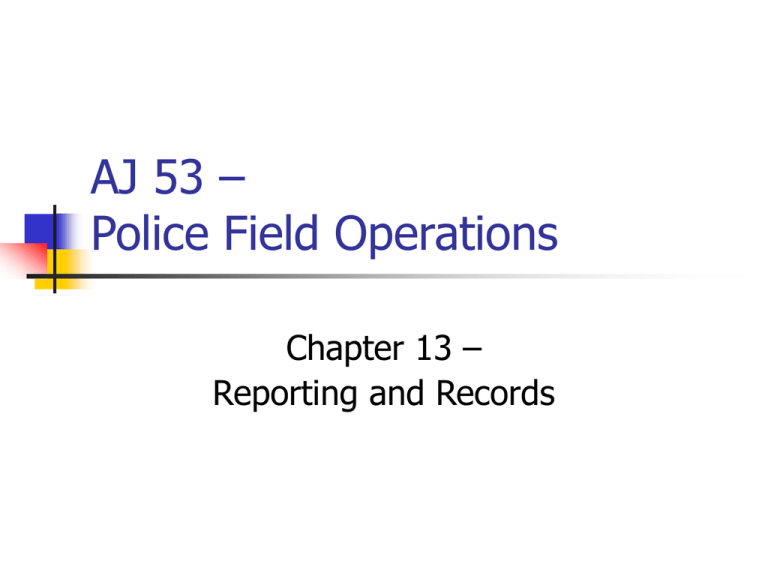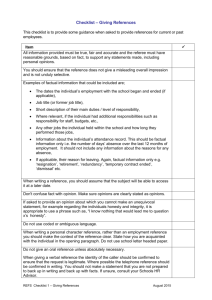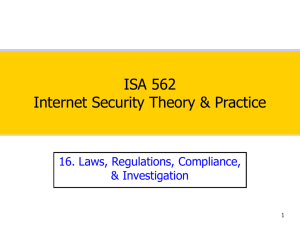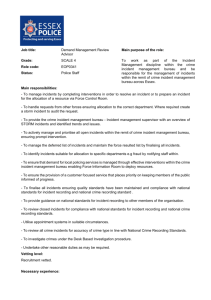AJ 53 – Police Field Operations - Sierra College Administration of
advertisement

AJ 53 – Police Field Operations Chapter 13 – Reporting and Records Importance of Report Writing To ensure Due Process, must have sufficient information & evidence to assist… Follow-Up Investigators Prosecutors, Defense Attorneys Judges, Jury Members Legal document which becomes a permanent record of particular crime or incident Impact of report writing? May take up 50% of actual patrol shift! Uses of Reports Identify, apprehend, prosecute criminals Assist DA’s, PD’s, & other agencies Assist officer before & during testimony Help determine civil liability Compile criminal justice statistics Allocate resources Provide information for Media & Public Serve as basis for officer performance evaluation Field Notes Provide basic information for report Must be clear and accurate! Identifying information of all parties Summary of individuals’ statements Weather, lighting, etc. Must be able to read/understand what you wrote Names, addresses, times, etc. Serve as outline for final Report Face Page and Narrative Field Note Considerations Best type of notebook to use? New/separate page for each incident Clearly indicate date/time/case no., etc. Tape record interviews when possible Advantages/Disadvantages to each size Consider having more than one available Aids with recall of exact statements made Include Facts only, no personal opinions Field notes are Discoverable! Questions to Ask Who? What? When? Where? Why? How? Refer to list, page 436-437 Retain or Destroy? May be determined by Department Policy If you choose to retain… How? Where? How long? Courts have upheld destruction, if… Notes destroyed in good faith Content has been transferred to report Report accurately represents notes Defense has access to officer’s report Note-Taking Techniques Interview people individually/separately Use quotation marks for exact quotes Paraphrase statements but do not compromise on accuracy Keep notes clear, simple, and legible! Establish a consistent style Report-Writing Considerations Must describe something you may not have witnessed personally Must clearly describe event to others who were not present Relying on second/third-hand accounts Supervisors, Investigators, DA, Court, etc. Due Process requires report to be… Clear, Factual, Accurate, Complete Report Writing (continued) Review notes Make an Outline Clarity and accuracy of information Arrange notes in chronological order Identify key actions, statements, etc Mentally create a rough draft before writing actual report Proofread after writing report Print & read, read aloud, another person… Narrative Content & Format Introduction Body Day, date, time, location How officer became involved Victim/Witness statements Conclusion Officer actions Disposition of evidence, suspects, etc. Follow-up required Report Content Free Flowing Narrative style First-Person vs. Third-Person As if telling a story to someone Use paragraphs for clarity & understandability Officer = “I” Names of Persons Involved Full names at first, last names thereafter May have to use first names for clarity Avoid ambiguous pronouns, words, phrases, etc. (p. 454-455) Facts vs. Opinions Report should be objectively factual/accurate Opinions may be based on factual information Types of Reports Crime/Offense/Arrest Reports Document occurrences of specific crimes… Suspect information, weapons used Property, physical evidence, chain-of-custody Incident Reports Corpus delicti, crime elements, MO Document non-criminal or civil incidents/events Specialized Report Forms Traffic Collision, DUI, 11550 H&S, 10851 VC, etc. Records Management Law Enforcement relies heavily on reports and records keeping Crime statistics Types of calls Response times Records Management System Storage of reported data that is somehow retrievable Must be reliable and accurate Uses of LE Records Crimes & Incidents Arrests Offender Registration Warrants Wanted Persons Missing Persons Lost/Stolen Property Vehicle Registration Stolen Vehicles Towed Vehicles Gun Registration











